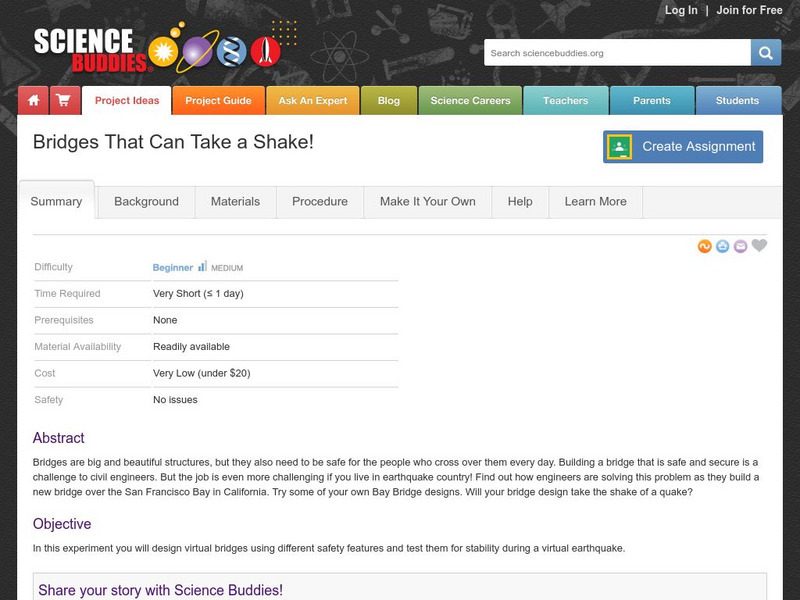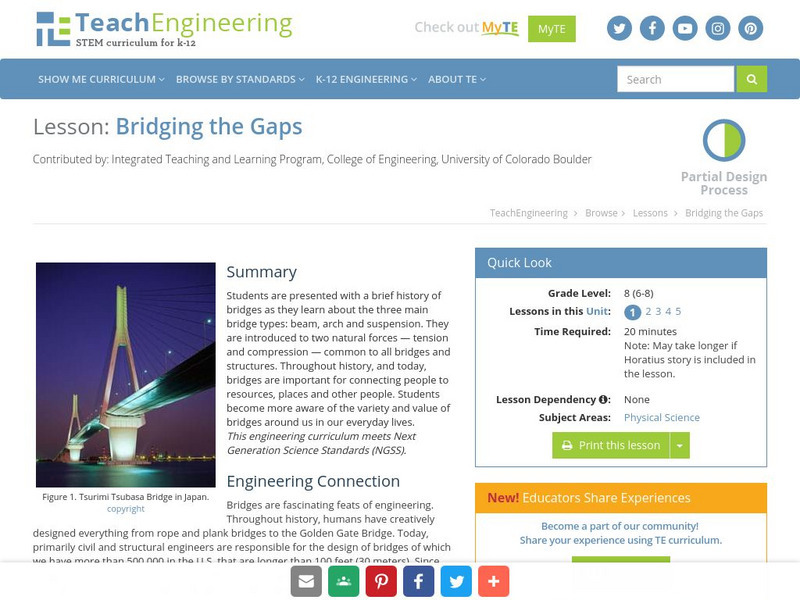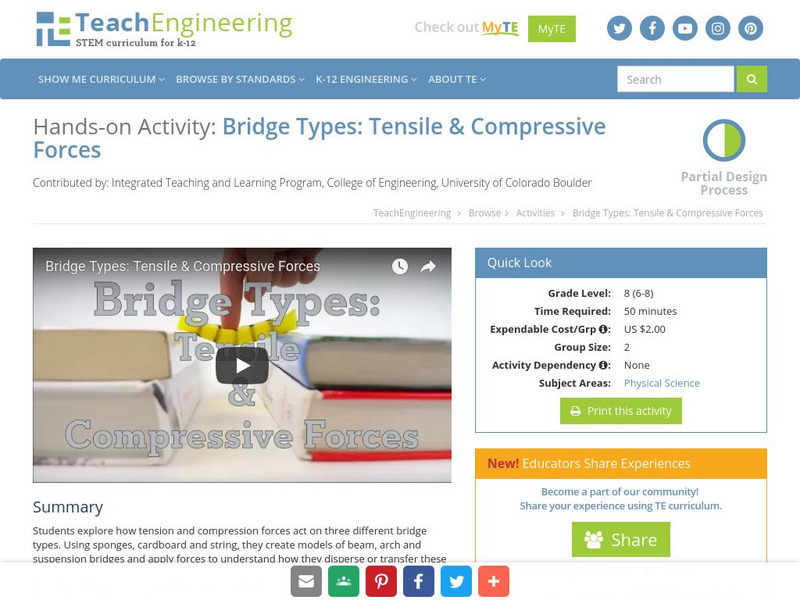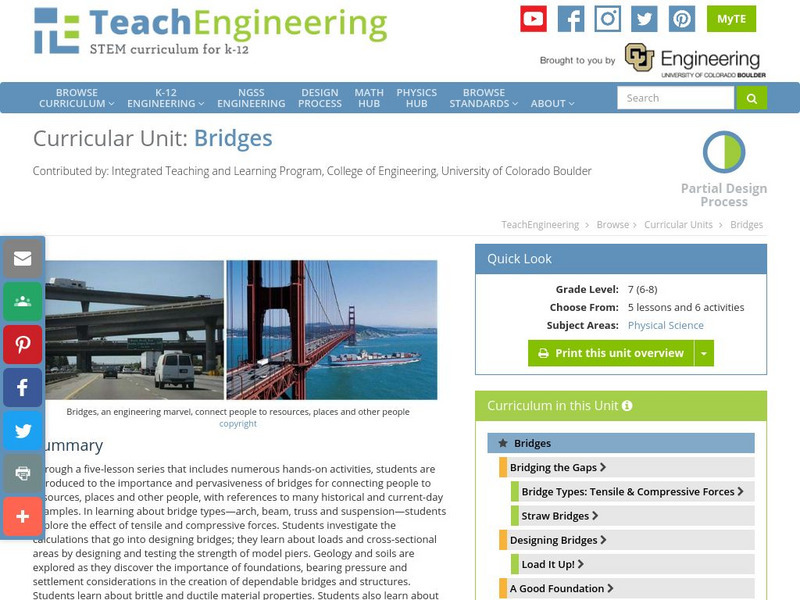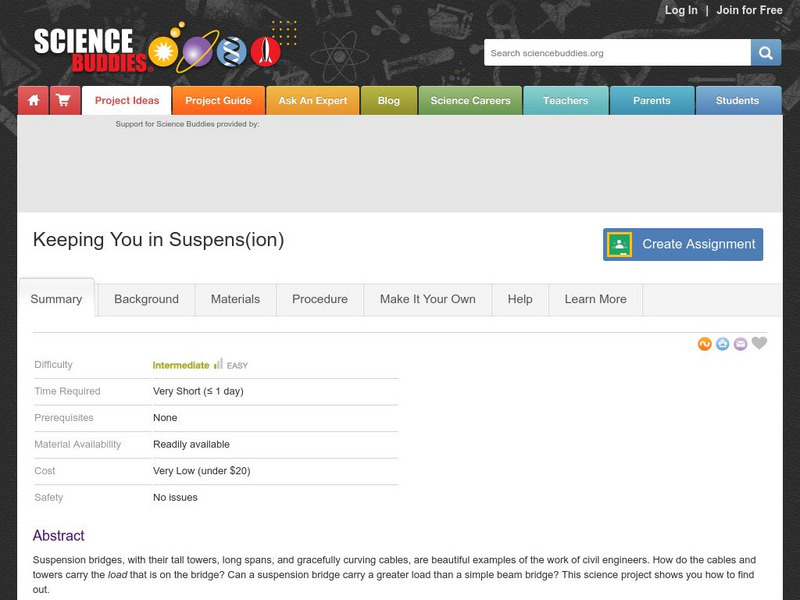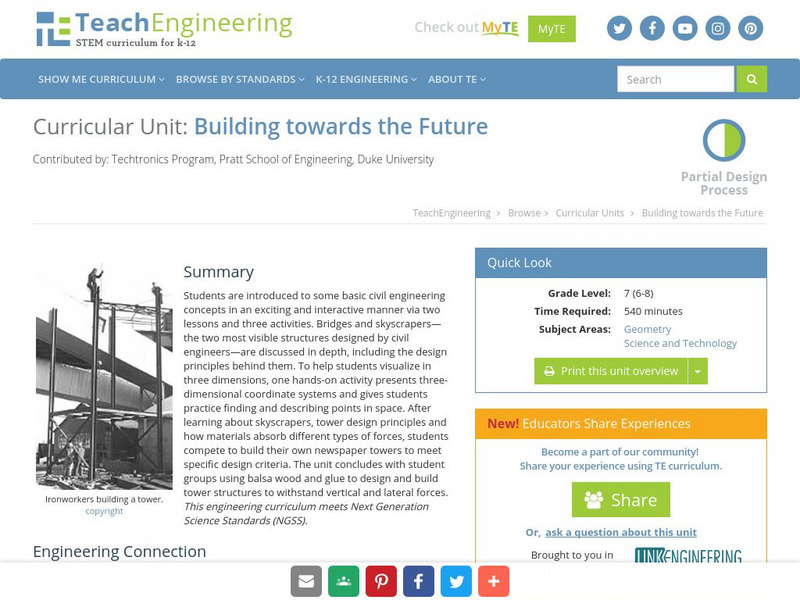The Tech Interactive
The Tech Museum of Innovation: Bridging the Gap [Pdf]
Can your team build the appropriate bridge to fit the needs of various terrains? In this lesson, students will build an assigned bridge in order to increase knowledge of various types of bridges. Students will then engage in a design...
Merriam-Webster
Merriam Webster: Dictionary Illustration: Types of Bridges
Labeled illustration of five types of bridges: beam bridge, truss bridge, arch bridge, suspension bridge, and cable-stayed bridge.
PBS
Nova: Build a Bridge
This exciting and interactive site illustrates the four main types of bridge building styles. Also contains games and hands-on descriptions. Appropriate for upper elementary and middle school students.
Next.cc
Next: Bridges
Complete these three activities to learn about the six main types of bridges and their uses. Includes links to explore related material.
Science Buddies
Science Buddies: Bridges That Can Take a Shake!
Building a bridge in San Francisco has to take into account the possibilites of earthquakes. This Science Buddies science project asks that you use different virtual bridge designs to withstand virtual earthquakes. The Science Buddies...
Science Education Resource Center at Carleton College
Serc: Bridges, Building and Breaking
Students will design, build and test the load bearing capacity of a scale model bridge. They will explore types of bridges. Learn about forces that effect bridges. Make scale drawings. Grading rubric is included as is a presentation for...
TeachEngineering
Teach Engineering: Bridging the Gaps
Students are presented with a brief history of bridges as they learn about the three main bridge types: beam, arch and suspension. They are introduced to two natural forces - tension and compression - common to all bridges and...
Science Buddies
Science Buddies: Bridge Building Bonanza: Which Design Wins?
In this activity, you build and test two types of bridges: a simple suspension bridge and a beam bridge. Which bridge design is stronger?
PBS
Pbs Teachers: Secrets of Lost Empires Ii: China Bridge: Bridge the Gap
Learn about the four major types of bridges and then test your knowledge by matching the right bridge to the right location.
Tech4Learning
Pics4 Learning: Images for Education: Bridges
A large collection of beautiful photos of various bridges from around the world! A visual reference for teachers and students. Browse through the examples, then click to enlarge.
TeachEngineering
Teach Engineering: Bridge Types: Tensile & Compressive Forces
Students explore how tension and compression forces act on three different bridge types. Using sponges, cardboard and string, they create models of beam, arch and suspension bridges and apply forces to understand how they disperse or...
TeachEngineering
Teach Engineering: Building Our Bridge to Fun!
Students identify different bridge designs and construction materials used in modern day engineering. They work in construction teams to create paper bridges and spaghetti bridges based on existing bridge designs. Students progressively...
TeachEngineering
Teach Engineering: Bridges
Through a five-lesson series that includes numerous hands-on activities, students are introduced to the importance and pervasiveness of bridges for connecting people to resources, places and other people, with references to many...
Science Buddies
Science Buddies: Keeping You in Suspens(ion)
Find out the different strengths of two types of bridges, beam and suspension, by building your own. This Science Buddies science project gives you the means to find out. The Science Buddies project ideas are set up consistently...
California Digital Library
Calishpere: Bridges
A broad selection of images featuring bridges can be found on this site by Calisphere. By clicking on individual images you'll find high quality photographs and image information.
TeachEngineering
Teach Engineering: Designing Bridges
Students learn about the types of possible loads, how to calculate ultimate load combinations, and investigate the different sizes for the beams (girders) and columns (piers) of simple bridge design. Students learn the steps that...
TeachEngineering
Teach Engineering: Building Towards the Future
This curricular unit introduces students to basic Civil Engineering concepts in an exciting and interactive manner. Bridges and skyscrapers, the two most visible products of Civil Engineers, will be discussed in depth. Students will have...
Curated OER
Science Kids: Science Images: Suspension Bridge
This photo shows a common type of bridge known as a suspension bridge. The Clifton Suspension Bridge stretches over the River Avon in Bristol, England. It was designed by a famous civil engineer named Isambard Kingdom Brunel. For more...
TeachEngineering
Teach Engineering: Load It Up!
Students take a hands-on look at the design of bridge piers (columns). First they brainstorm types of loads that might affect a Colorado bridge. Then they determine the maximum possible load for that scenario, and calculate the...
TeachEngineering
Teach Engineering: Truss Destruction
Students work within constraints to construct model trusses and then test them to failure as a way to evaluate the relative strength of different truss configurations and construction styles. Each student group uses Popsicle sticks and...
PBS
Pbs Mathline: Stressed to the Breaking Point Lesson Plan [Pdf]
Students explore how much weight a spaghetti bridge can support and whether width and length matter. Printable lesson.
Other
Thales: Estructuras
Learn about structures, the types of resistant structures, the basic elements of the structure and bridges. It contains several interactive exercises.
TeachEngineering
Teach Engineering: Cost Comparisons
Students learn about the many types of expenses associated with building a bridge. Working like engineers, they estimate the cost for materials for a bridge member of varying sizes. After making calculations, they graph their results to...
Other
Write Design: Graphic Organizers: Sequence
Lists and describes several types of graphic organizers which fall under the "sequence" mold, including a ranking table, continuum scale, cycle, bridging snapshots, series of events chain, and a problem/solution outline.
![The Tech Museum of Innovation: Bridging the Gap [Pdf] Lesson Plan The Tech Museum of Innovation: Bridging the Gap [Pdf] Lesson Plan](https://d15y2dacu3jp90.cloudfront.net/images/attachment_defaults/resource/large/FPO-knovation.png)


